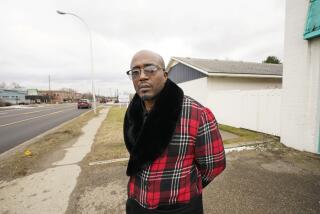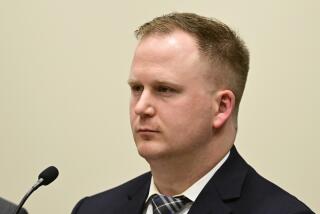Novel legal theory may be tested at trial of officer in Freddie Gray case
Prosecutors are expected to test a novel legal theory this week in the trial of a police officer charged in the arrest and death of Freddie Gray — that the officer didn’t have the authority to detain him and therefore committed an assault by putting him in handcuffs.
The allegation could have widespread implications for policing in Baltimore and Maryland. Hundreds of detainees in the city are released every year after being arrested without being charged.
Officer Edward M. Nero’s defense team argues that police shouldn’t be second-guessed — and face criminal charges — when they carry out their duties in good faith. But prosecutors say officers should face consequences when their actions turn out to be wrong, and the consequences are so catastrophic.
By taking a chance with this kind of case, legal experts said, Baltimore’s State’s Atty. Marilyn J. Mosby must believe she is correctly interpreting the law and has the political will.
“Is it a gutsy theory? Yes. Do I think most prosecutors would have brought charges on this theory? Probably not,” said Paul Butler, a former federal prosecutor who is now a Georgetown University law professor. “But these are extraordinary times, and Baltimore is a city where a lot of the usual political dynamics don’t apply.”
Nero, 30, is headed to trial after months of delays and appeals over procedural matters that reached the state’s highest court. He has pleaded not guilty to charges of second-degree assault, two counts of misconduct in office, and reckless endangerment.
All of the charges are misdemeanors.
Resident-filmed video of Freddie Gray wailing and dragging his legs while being arrested drew outrage, and Gray’s death from injuries suffered while in police custody drew widespread protests. But prosecutors are not alleging excessive force or brutality by the six police officers charged in the case.
The first trial in the Gray case — against Officer William Porter, who checked on Gray during his transport and faces charges including involuntary manslaughter — ended in a hung jury and mistrial in December.
The second trial will turn the focus away from Gray’s fatal spinal injuries, which the medical examiner found were sustained in the back of a police transport van, to whether officers committed a crime when they pursued and arrested him on April 12, 2015.
It’s also expected to lead to the first verdict. Nero is likely to request a bench trial, according to legal observers, so that Judge Barry Williams would render the verdict, not a jury.
The reckless endangerment charge relates to Gray’s being loaded into a van without being restrained by a seat belt. Prosecutors said the failure of officers, including Nero, to do so “not only knowingly risked injury or death to Mr. Gray, but actually resulted in it.”
Nero’s defense attorneys sought to have the charges dismissed, saying the officers had legal justification to pursue Gray as he ran unprovoked through the area around Gilmor Homes, a Baltimore Housing Authority project, and had probable cause to arrest him after finding a knife clipped to his belt. In filing charges, prosecutors said the knife was legal.
Nero’s attorneys, Marc Zayon and Allison Levine, wrote in a recent court filing that they couldn’t locate a “single case” in which an officer had been criminally charged with assault on the basis that an arrest was made without probable cause.
Chuck Canterbury, president of the national Fraternal Order of Police union, said Nero and the other officers were “under an honest belief” that they acted properly at the time of Gray’s arrest.
“It’s unprecedented to see a prosecutor try to charge under those circumstances,” Canterbury said. “A prosecutor has months to review something, when a police officer has to make a snap decision.... An error is not a criminal matter; it’s just a mistake.”
When officers make arrests, prosecutors review the allegations and routinely throw out cases that they determine lack probable cause or which they think are not worth pursuing. When police arrests peaked a decade ago, prosecutors were declining about one-third of those cases — or tens of thousands or arrests.
Arrests have plummeted, along with the number of rejected cases. Still, in hundreds of cases each year, prosecutors at central booking in Baltimore refuse to file charges.
And charges are not filed against the officers for making the wrong call, Nero’s attorneys have said in court filings.
“Common sense dictates that officers would simply not make arrests if they were subject to criminal prosecution if it was later determined that probable cause did not exist,” Zayon wrote.
Prosecutors in the Gray case said how prosecutors handle other cases is immaterial. The crux of this case is whether Nero “violated the duties of his office or acted reasonably toward Mr. Gray,” they wrote.
“The state does not minimize the difficulty inherent in the split-second judgments police officers make every day, nor does the state seek to criminalize every technical violation of the Fourth Amendment; but here, the state has alleged that the defendant’s conduct was objectively, criminally unreasonable,” prosecutors wrote.
“Maryland’s law of assault will forgive officers for justified actions, but will hold them to account for unjustified ones.”
Nero and Officer Garrett E. Miller were conducting a bicycle patrol around Gilmor Homes when they made eye contact with Gray, who ran. An arrest van was called to the scene, but Gray never made it to central booking.
The original charges against Nero included false imprisonment, but the charge was removed when the grand jury indictment was returned. Mosby said at the time that “additional information” had been discovered.
Robert Bloom, a professor at Boston College law school, said he believes the arresting officers lacked probable cause to handcuff Gray behind his back and place him on his stomach.
“There’s no probable cause as they stated the facts,” he said.
But, he added, “the government will need to show that this was a really bad act, in simple terms, for it to necessitate criminal punishment.”
Eugene O’Donnell, a former police officer and prosecutor who teaches at the John Jay College of Criminal Justice in New York, said officers often make arrests that turn out to lack probable cause for various reasons including a lack of training or bad information.
“It would be a dangerous precedent indeed to pursue charges against officers who act in good faith and have a reasonable, but mistaken, belief that someone is committing or has committed an offense,” O’Donnell said.
“On the other hand, if the prosecutors can prove beyond a reasonable doubt that this officer knew that the arrest was illegal and manufactured a story supported by false written and oral statements, then a conviction would be viable,” he said.
Miller and Porter are expected to be called as witnesses by the prosecution. Both have been granted immunity by Judge Williams from their testimony being used at their own trials, and they could be sent to jail if they refuse to comply after the state’s highest court compelled them to testify.
About three weeks before Gray’s arrest, the state’s attorney’s office had asked police to target the intersection with “enhanced” drug enforcement efforts. Once officers caught up to Gray, he was restrained and handcuffed, and they found a knife on his belt.
A 2000 Supreme Court ruling, Illinois v. Wardlow, has upheld that the combination of unprovoked flight in an area known for “high crime” provides sufficient suspicion for a stop. Another ruling from decades earlier found that police can stop someone without probable cause if they have “reasonable suspicion” the person has or is about to commit a crime, or may be armed and dangerous.
Much of the early jockeying over the charges centered on Gray’s knife. In announcing the charges, Mosby said the knife was legal under Maryland law, making his arrest improper.
Defense attorneys countered that it was “spring-assisted” and illegal under city code. They noted that police and prosecutors continue to charge people with possessing spring-assisted knives.
Later, prosecutors called the discrepancy over the knife a “moot” issue because the initial detention, before the discovery of the knife, was illegal.
Still, prosecutors have maintained in recent filings that there is a distinction between “spring-assisted” knives — the kind prohibited by city code — and “switchblades” like they contend Gray carried. They listed a Frederick knife shop owner as an expert witness whom they plan to call and have subpoenaed records from the Cop Shop, a supply store near police headquarters that sells knives.
“The state will present evidence at trial that so-called ‘spring-assisted knives’ are among the most commonly sold folding knives in Maryland and are not the same thing as ‘switchblades,’” prosecutors wrote.
Nero’s attorney has noted that Miller made the arrest and wrote the charging document, and that Nero relied on direction from Lt. Brian Rice, another officer charged in the case. Nero “cannot be legally responsible for the initial detention” or the arrest of Mr. Gray, his attorney contends.
“Defendant Officer Nero should be tried, and legally must be tried based upon his own actions, not those of any other officer or any other person,” Zayon wrote.
Prosecutors also say they have experts who have evaluated the circumstances surrounding Gray’s injuries and death and will explain that Nero’s conduct created the risk that led to those injuries.
But defense attorneys don’t want Gray’s death to even be mentioned in court, saying it would be prejudicial and isn’t necessary to prove the conduct created a risk.
Baltimore Sun reporter Kevin Rector contributed to this article.
ALSO
As Denver enjoys boom times, the homeless go into hiding
North Carolina sues federal government to preserve state’s LGBT law
The nation’s subways are falling apart, but the next president might actually fix them
More to Read
Start your day right
Sign up for Essential California for news, features and recommendations from the L.A. Times and beyond in your inbox six days a week.
You may occasionally receive promotional content from the Los Angeles Times.







